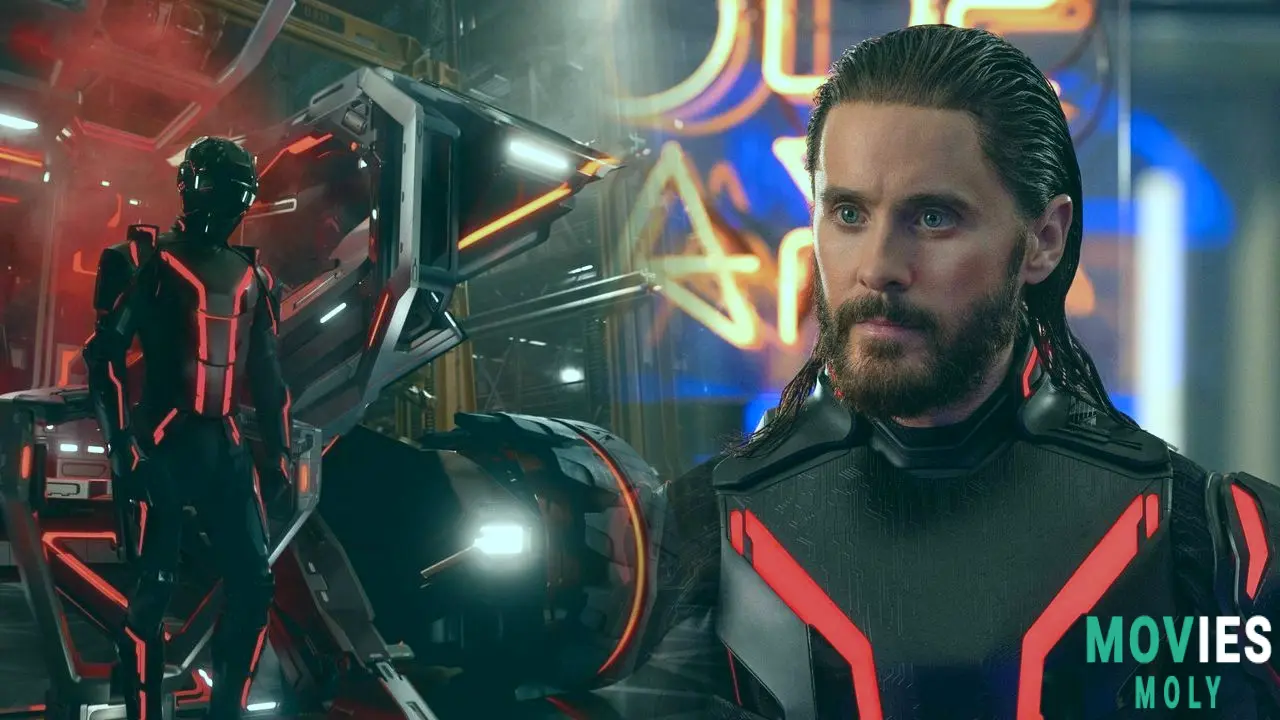Disney's highly anticipated return to the digital world with Tron: Ares has hit theaters, but despite its stunning visuals and a mid-credits scene teasing more, it's facing some serious struggles at the box office.
TL;DR:
- Tron: Ares has earned around $125.4 million worldwide against a $180 million budget, making it a significant box office disappointment.
- Production was reportedly plagued by creative clashes, costly reshoots, and a "tug-of-war" over the script involving star Jared Leto and director Joachim Rønning.
- The film introduces a darker aesthetic, a Nine Inch Nails score (replacing Daft Punk), and a story about an AI emerging into the real world, with a mid-credits scene setting up a future villain.
Alright, Tron fans, we finally got our third trip to the Grid with Tron: Ares, and wow, what a ride it's been – not just on screen, but behind the scenes and at the Box Office. After a 15-year wait since Tron: Legacy (and a whopping 43 years since the original!), Disney unleashed its latest sci-fi epic on October 10, 2025, hoping to reignite the cult classic franchise.
But here's the kicker: despite the dazzling visual spectacle and a fresh narrative, Tron: Ares has seriously struggled to find its footing financially. It's a tale of ambition meeting a harsh reality, leaving many wondering what truly happened and what it means for the future of this beloved digital universe. Let's dive deep into the bytes and pieces of this new installment.
A New Vision for the Grid: Story and Stellar Cast Explorations

This isn't a straight-up sequel to Legacy in the way many expected, but rather a direct continuation that carves its own path. Directed by Joachim Rønning, Tron: Ares follows Ares (Jared Leto), a self-aware program that makes the leap from the digital Grid into the human world. The story, co-written by Jesse Wigutow and David DiGilio, centers on Ares' journey of self-discovery, questioning his purpose, and exploring what it truly means to exist, feel, and break free from his creators' control.
Alongside Leto, Greta Lee shines as Eve Kim, a human programmer who partners with Ares. Evan Peters steps in as Julian Dillinger, the slick and calculating CEO of Dillinger Systems, while Jodie Turner-Smith plays Athena, an antagonist program. And yes, the legendary Jeff Bridges makes a brief but impactful return as Kevin Flynn, providing a touch of nostalgic closure without overshadowing the new narrative. Other notable cast members include Hasan Minhaj, Arturo Castro, and Gillian Anderson, rounding out a talented ensemble.
The film deliberately expands on the "permanence code" concept, building directly on Quorra's (Olivia Wilde, who doesn't physically appear in Ares but is referenced) transition from the Grid to the real world at the end of Legacy. This time, it's about reverse-engineering that process, leading to the intriguing collision of digital and physical realities.
"There’s something at work inside my soul I do not understand. I came here to find something. Something important. Permanence."
— Ares (Jared Leto) in Tron: Ares
Diving into the Aesthetic Shift: Colors, CGI, and Sonic Changes

Visually, Tron: Ares is a bold departure. Forget the cool blues and neon glow of Legacy; Rønning has painted the Grid in fiery reds and industrial shadows, evoking a sense of rebellion and raw energy. The CGI is consistently described as "mind-blowing," feeling tangible and smooth, with the camera effortlessly gliding through massive digital landscapes and intense light-cycle chases. Ares' reflection in his armor and his final white-suit rebirth are particular visual highlights that underline the film's thematic depth.
Perhaps the most significant change for long-time fans is the soundtrack. With Daft Punk, who crafted Legacy's iconic electronic score, having disbanded in 2021, the torch was passed to Nine Inch Nails' Trent Reznor and Atticus Ross. Their score is a dramatic shift, leaning into "abrasive and unsettling" harsh electronics and rhythmic patterns, stripping away orchestral elements to create an "industrial melancholy" that hums, crackles, and growls. Reznor himself noted there's "not one second of orchestra" in their work, aiming for something "precise and unpleasant at times." While some critics praised this darker, heavier, and more human soundscape, others found it to be "nails on a chalkboard" and "barely playable," making calm scenes feel chaotic due to constant background noise.
Behind-the-Scenes Hurdles: Unveiling the Production Conflicts

It seems the journey to the screen for Tron: Ares was anything but smooth, with reports detailing significant creative tension and production challenges. Insiders describe the process as a "tug-of-war" over the script and creative control. Jared Leto, known for his intense method acting, reportedly pushed for notable script changes, while director Joachim Rønning initially backed an earlier draft by Jez Butterworth.
This creative deadlock led to a "carousel of script doctors," with Billy Ray brought in for late fixes after principal photography had already wrapped. The result? Costly reshoots and a ballooning budget, suggesting that multiple voices trying to assert their ideas on a single narrative created a "lack of cohesion" in the final product. Writer Jesse Wigutow confirmed that the project significantly pivoted from being a direct Legacy sequel to one built around the character of Ares, who was originally conceived as a smaller villain role in an earlier iteration called Tron: Ascension. These internal struggles likely contributed to the film's eventual commercial performance.
The Box Office Reality Check: Why Ares Faced Such Tough Times

Let's talk numbers, and unfortunately for Disney, they're not looking great for Tron: Ares. The movie carried a reported production budget of $180 million – the biggest for any Tron film (not adjusted for inflation). However, its cumulative global box office stands at around $125.4 million, with $65.1 million from domestic theaters and $60.3 million internationally. This means the film hasn't even recouped its production budget, let alone the extensive marketing costs.
Industry estimates suggest a film typically needs to earn two to two-and-a-half times its production budget to break even, accounting for marketing and the split with theaters. For Tron: Ares, this would mean a break-even point of roughly $400-450 million. With its current trajectory, it's projected to fall more than $200 million short of that, leading to an estimated overall loss for Disney of at least $100 million, potentially up to $132 million.
For context, its predecessor, 2010's Tron: Legacy, grossed over $400 million worldwide on a $170 million budget (which would be around $251.9 million adjusted for inflation), making it a more profitable venture. While Tron: Ares did manage to pass a few other 2025 titles like Smurfs and Karate Kid: Legends at the global box office, and even surpassed Christopher Nolan's Tenet and the domestic take of Denzel Washington's Dèjá Vu, these are small victories in the face of its larger financial shortfall.
A Divided Reception: Audience and Critics Weigh In on the Experience

The reception for Tron: Ares has been a bit of a mixed bag, which can happen with a bold reboot like this. Interestingly, while the box office numbers signal a commercial flop, some reports highlight an "incredible 86 percent audience rating on Rotten Tomatoes," suggesting that those who did see it generally enjoyed the experience. This contrasts with what's implied by the wider "struggled to connect with audiences" narrative.
On the positive side, many praised the film's "visually stunning" aesthetic, the ambitious world-building, and its deeper thematic explorations of creation, control, and empathy. Jared Leto's performance, despite some conflicting opinions, was described by some as "controlled and magnetic," while Greta Lee's portrayal of Eve brought "intelligence and quiet empathy." Jeff Bridges' return was appreciated for its "nostalgic closure."
However, the film wasn't without its criticisms. Some found the plot "predictable," falling into the "AI-going-rogue trope" without fresh takes on the modern AI conversation. Leto's performance was also called "dry and uninteresting" with a "blank expression" by one review. Other critiques pointed to the second act stalling due to "excessive exposition," a villain lacking depth, and an underused Grid setting that felt "no more interesting than an everyday WiFi router." The Nine Inch Nails score, as mentioned, also drew polarizing reactions.
What's Next for the Tron Universe and Its Digital Future?
Despite its struggles, Tron: Ares definitely leaves the door open for more. Yes, there's a mid-credits scene! After the main story wraps, stick around because it functions as a major setup for a potential Tron 4. We see Julian Dillinger, after uploading his consciousness, awaken in a damaged digital landscape. He finds a retro identity disc, and upon grasping it, transforms into a Sark-like villain, reminiscent of the antagonist from the original 1982 Tron film. This suggests a human who voluntarily became a program for power, setting up a formidable threat for future installments.
However, the film's significant box office underperformance casts a long shadow over these sequel prospects. While Disney could see a boost from VOD, streaming (it's expected on Disney+ in early 2026, following the typical 45-90 day theatrical window), and physical media, it might not be enough to justify the massive budget required for another effects-heavy Tron movie.
As for Jared Leto, his next big role is playing Skeletor in the live-action Masters of the Universe movie, set for release on June 5, 2026. Whether that film will premiere in theaters or go straight to Prime Video/Amazon MGM+ is still under deliberation by Amazon MGM. For now, the future of the Grid remains as uncertain as the lines between its digital and physical realms.
Frequently Asked Questions About Tron: Ares Q: Is Tron: Ares a sequel or a reboot? A: It functions as a direct continuation of the Tron franchise, expanding on the events of Tron: Legacy rather than rebooting the story entirely. It also aims to be a fresh entry point for newcomers. Q: Will Tron: Ares be streaming on Disney+? A: Yes, it is expected to stream on Disney+ in early 2026, following Disney's standard 45- to 90-day theatrical exclusivity window. Q: What is the runtime of Tron: Ares? A: The film has a runtime of 119 minutes. Q: Does Olivia Wilde appear in Tron: Ares? A: No, Olivia Wilde does not physically appear in Tron: Ares. Her character, Quorra, from Tron: Legacy, is referenced in the film, particularly regarding her transition to the real world.Sources:
- ScreenRant
- Box Office Mojo
- The Collegian
- Collider
- GIANT FREAKIN ROBOT
- Bleeding Cool






